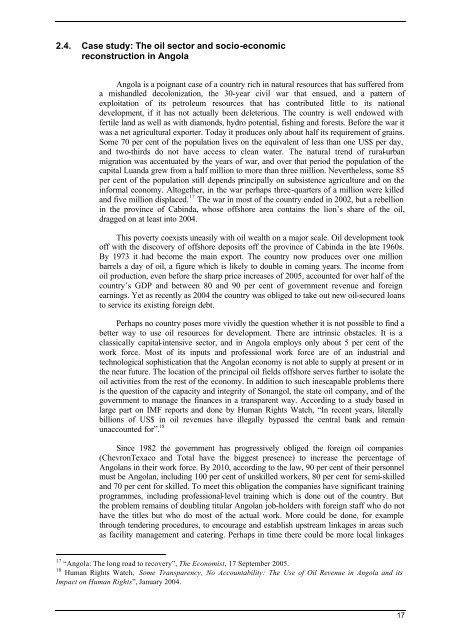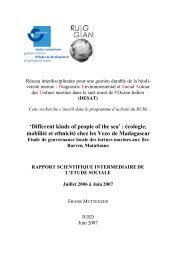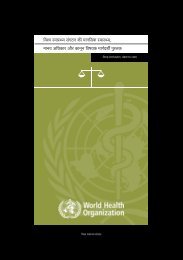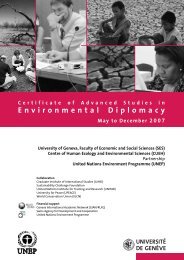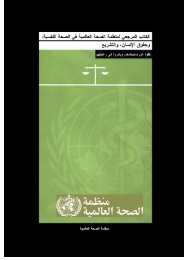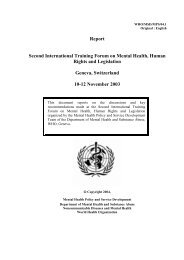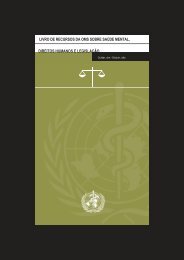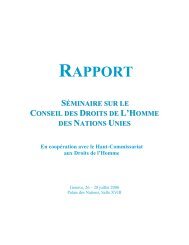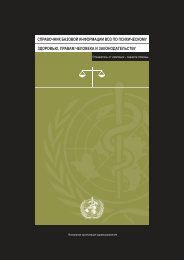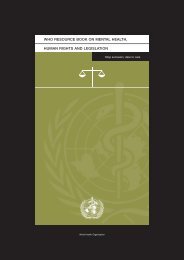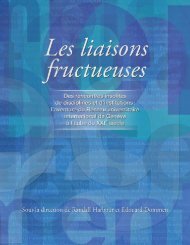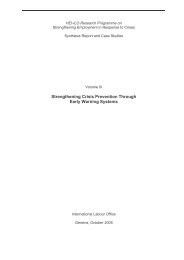Volume 1 Cedric - revised luca Final - RUIG-GIAN
Volume 1 Cedric - revised luca Final - RUIG-GIAN
Volume 1 Cedric - revised luca Final - RUIG-GIAN
Create successful ePaper yourself
Turn your PDF publications into a flip-book with our unique Google optimized e-Paper software.
2.4. Case study: The oil sector and socio-economicreconstruction in AngolaAngola is a poignant case of a country rich in natural resources that has suffered froma mishandled decolonization, the 30-year civil war that ensued, and a pattern ofexploitation of its petroleum resources that has contributed little to its nationaldevelopment, if it has not actually been deleterious. The country is well endowed withfertile land as well as with diamonds, hydro potential, fishing and forests. Before the war itwas a net agricultural exporter. Today it produces only about half its requirement of grains.Some 70 per cent of the population lives on the equivalent of less than one US$ per day,and two-thirds do not have access to clean water. The natural trend of rural-urbanmigration was accentuated by the years of war, and over that period the population of thecapital Luanda grew from a half million to more than three million. Nevertheless, some 85per cent of the population still depends principally on subsistence agriculture and on theinformal economy. Altogether, in the war perhaps three-quarters of a million were killedand five million displaced. 17 The war in most of the country ended in 2002, but a rebellionin the province of Cabinda, whose offshore area contains the lion’s share of the oil,dragged on at least into 2004.This poverty coexists uneasily with oil wealth on a major scale. Oil development tookoff with the discovery of offshore deposits off the province of Cabinda in the late 1960s.By 1973 it had become the main export. The country now produces over one millionbarrels a day of oil, a figure which is likely to double in coming years. The income fromoil production, even before the sharp price increases of 2005, accounted for over half of thecountry’s GDP and between 80 and 90 per cent of government revenue and foreignearnings. Yet as recently as 2004 the country was obliged to take out new oil-secured loansto service its existing foreign debt.Perhaps no country poses more vividly the question whether it is not possible to find abetter way to use oil resources for development. There are intrinsic obstacles. It is aclassically capital-intensive sector, and in Angola employs only about 5 per cent of thework force. Most of its inputs and professional work force are of an industrial andtechnological sophistication that the Angolan economy is not able to supply at present or inthe near future. The location of the principal oil fields offshore serves further to isolate theoil activities from the rest of the economy. In addition to such inescapable problems thereis the question of the capacity and integrity of Sonangol, the state oil company, and of thegovernment to manage the finances in a transparent way. According to a study based inlarge part on IMF reports and done by Human Rights Watch, “In recent years, literallybillions of US$ in oil revenues have illegally bypassed the central bank and remainunaccounted for”. 18Since 1982 the government has progressively obliged the foreign oil companies(ChevronTexaco and Total have the biggest presence) to increase the percentage ofAngolans in their work force. By 2010, according to the law, 90 per cent of their personnelmust be Angolan, including 100 per cent of unskilled workers, 80 per cent for semi-skilledand 70 per cent for skilled. To meet this obligation the companies have significant trainingprogrammes, including professional-level training which is done out of the country. Butthe problem remains of doubling titular Angolan job-holders with foreign staff who do nothave the titles but who do most of the actual work. More could be done, for examplethrough tendering procedures, to encourage and establish upstream linkages in areas suchas facility management and catering. Perhaps in time there could be more local linkages17 “Angola: The long road to recovery”, The Economist, 17 September 2005.18 Human Rights Watch, Some Transparency, No Accountability: The Use of Oil Revenue in Angola and itsImpact on Human Rights”, January 2004.17


